 Shennette Garrett-Scott, Associate Professor of History & African American Studies was recently interviewed by Mississippi Public Broadcasting’s Think Radio. You can catch her interview, which starts at 18:04, by clicking here.
Shennette Garrett-Scott, Associate Professor of History & African American Studies was recently interviewed by Mississippi Public Broadcasting’s Think Radio. You can catch her interview, which starts at 18:04, by clicking here.
 Shennette Garrett-Scott, Associate Professor of History & African American Studies was recently interviewed by Mississippi Public Broadcasting’s Think Radio. You can catch her interview, which starts at 18:04, by clicking here.
Shennette Garrett-Scott, Associate Professor of History & African American Studies was recently interviewed by Mississippi Public Broadcasting’s Think Radio. You can catch her interview, which starts at 18:04, by clicking here.
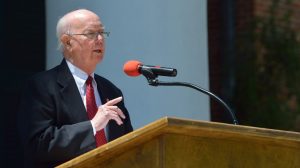
David G. Sansing, professor emeritus of history at the University of Mississippi and author of the definitive history of the university, died Saturday (July 6) in a Memphis hospital one day after suffering a fall at his Oxford home. He was 86.
A beloved historian, writer and teacher, Sansing spent his career shining an honest spotlight on the complicated history of his home state through great writing and heartfelt stories. His writing and teaching have touched hundreds of thousands of Mississippi students over several decades.
“We are deeply saddened by the loss of David Sansing,” said Noel Wilkin, provost and executive vice chancellor for academic affairs. “He was an outstanding university citizen who made substantial contributions to our institution.
“It is a sad day for the entire university community, and he will be greatly missed.”
Sansing published dozens of scholarly papers and authored more than a dozen books and textbooks on various aspects of Mississippi history, including “The University of Mississippi: A Sesquicentennial History,” “Making Haste Slowly: The Troubled History of Higher Education in Mississippi” and “Mississippi Governors: Soldiers, Statesmen, Scholars and Scoundrels.”
His last book, “The Other Mississippi: A State in Conflict with Itself,” was published in 2018 as a compilation of articles, essays, speeches and lectures given throughout Sansing’s career. His 2013 textbook, “A Place Called Mississippi,” remains in use in public and private high schools throughout the state.
“David Sansing was my professor and friend for 50 years,” U.S. Sen. Roger Wicker tweeted Sunday. “Remembered me as a far better student than I actually was – What a loss for Mississippi!”
A native of Greenville, Sansing credited his 11th-grade history teacher, Nell Thomas, also of his hometown, with instilling in him a love of history. After serving in the U.S. Army during the Korean War, he earned both a Bachelor of Arts and Master of Arts in history from Mississippi College and a doctorate in history from the University of Southern Mississippi.
Sansing began teaching history at UM in 1970. In 1990, he was named the university’s Teacher of the Year.
Sansing is survived by his wife of 61 years, Elizabeth; three children, David Sansing Jr., of Canton, Elizabeth Sansing McLarty, of Jackson, and Perry Sansing, of Oxford, who serves as the university’s special assistant to the chancellor for governmental affairs; and five grandchildren, Cherish Sansing, Mary Love McLarty, Michael McLarty, Kimberly Sansing Molteni and Elizabeth Sansing Eaves.
All eight of Sansing’s children and grandchildren earned degrees from UM.
A memorial service for Sansing is set for 4 p.m. Wednesday (July 10) at Paris-Yates Chapel on the university campus.
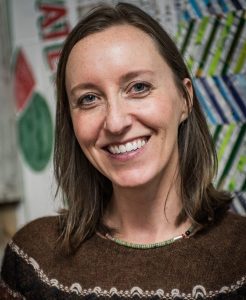 The Andrew W. Mellon Foundation has recognized the work of several University of Mississippi partners through a $300,000 grant supporting the collection, preservation, future research and accessibility of LGBTQ history in Alabama, Mississippi and Georgia.
The Andrew W. Mellon Foundation has recognized the work of several University of Mississippi partners through a $300,000 grant supporting the collection, preservation, future research and accessibility of LGBTQ history in Alabama, Mississippi and Georgia.
The grant went to the Invisible Histories Project, founded in 2016 by Joshua Burford and Maigen Sullivan and based in Birmingham, Alabama, with money also going to the satellite Invisible Histories Project-Mississippi.
Mississippi partners on the grant include the university’s Center for the Study of Southern Culture, Sarah Isom Center for Women and Gender Studies, and Department of Archives and Special Collections. The goal of the project is to expand and make publicly available manuscript and oral history collections that document LGBTQ histories of Mississippi.
“The project provides a unique opportunity to collaborate across campus departments and units, as well as across the Southeast, to bring together scholars devoted to interdisciplinary research,” said Jessica Wilkerson, UM associate professor of history and Southern Studies. “I’m excited to work with my colleagues on a cutting-edge, necessary project to document queer and Southern history.”
Besides Wilkerson, faculty members primarily involved in the project are Amy McDowell, assistant professor of sociology, and Jaime Harker, Isom Center director and professor of English.
The seeds of IHP-Mississippi were planted last year when Burford visited the Center for the Study of Southern Culture and met with Wilkerson and her Queer Southern History class, which was developing an oral history project. During that visit, Southern studies faculty and staff, the Isom Center, and Special Collections and Archives began exploring the possibility of starting an IHP satellite project at Ole Miss.
The university is the only IHP satellite site, although plans are for the University of West Georgia to become a satellite in spring 2020, Burford said.
“We have received the most amazing support from UM for this project and your outstanding staff and faculty have really been leaders in the expansion of our work,” said Burford, IHP’s director of community engagement. “They saw in us the potential of what Invisible Histories Project could do and invested early.
“There is so much amazing queer history in Mississippi and with the help of your campus, we are going to be leaders in the field of preservation and research of LGBTQ history both in and out of the South.”
Along with receiving $10,000 annually for two years to support the project, IHP-Mississippi will be part of the bigger IHP model. The project’s staff will provide support through site visits, helping to locate research opportunities, advising on queer history courses and research development, connecting institutions to repositories and community organizations, providing branding and paperwork, developing a site plan of goals and outcomes, and providing trainings for students and faculty.
Beyond that, joining the IHP network is mportant because it allows participants to learn from archivists and public historians already doing this work, Wilkerson said.
Burford and Sullivan will visit Oxford this summer to meet with the project team and develop a site plan for the 2019-20 academic year.
The project will benefit students and hopefully help attract up-and-coming scholars of the queer South, Wilkerson said.
“Of course, Jaime Harker is leading the way as a faculty member with her book ‘The Lesbian South,’” Wilkerson said.”Mostly, I was inspired by the group of students in my spring Southern studies seminar.
“They laid the groundwork for this project by conducting oral history interviews with gay, lesbian and queer community members in Oxford, and they showed me that a larger project was possible.”
Additionally, Wilkerson’s fall 2019 Southern studies graduate seminar will expand the oral history project begun last spring on Mississippi LGBTQ history. Wilkerson and McDowell also received an Isom Fellowship to help support the expanding LGBTQ oral history and archiving project.
The Andrew W. Mellon Foundation endeavors to strengthen, promote and, where necessary, defend the contributions of the humanities and the arts to human flourishing and to the well-being of diverse and democratic societies. To this end, it supports institutions of higher education and culture as they renew and provide access to an invaluable heritage of ambitious, path-breaking work.
The foundation makes grants in four core program areas: Higher Education and Scholarship in the Humanities, Arts and Cultural Heritage, Scholarly Communications, and International Higher Education and Strategic Projects.
More information on the Invisible Histories Project can be found at https://www.invisiblehistory.org/.
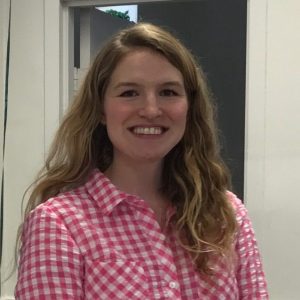 University of Mississippi student Katelyn Frazer in the Arch Dalrymple III Department of History, has been selected for a Fulbright Award to Spain.
University of Mississippi student Katelyn Frazer in the Arch Dalrymple III Department of History, has been selected for a Fulbright Award to Spain.
The Fulbright Program is devoted to increasing mutual understanding between the people of the United States and the people of other countries. Fulbright is the world’s largest and most diverse international educational exchange program. As a grantee, you will join the ranks of distinguished participants in the program. Fulbright alumni have become heads of state, judges, ambassadors, cabinet ministers, CEOs, and university presidents, as well as leading journalists, artists, scientists, and teachers. They include 59 Nobel Laureates, 82 Pulitzer Prize winners, 72 MacArthur Fellows, 16 Presidential Medal of Freedom recipients, and thousands of leaders across the private, public and non-profit sectors. Since its inception in 1946, more than 390,000 “Fulbrighters” have participated in the Program.
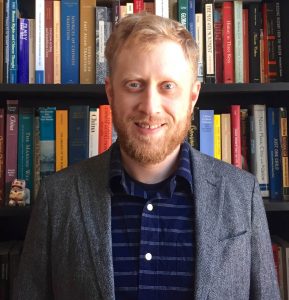 Peter Thilly, Assistant Professor of History, has received a postdoctoral fellowship for the 2019-20 academic year from the Henry Luce Foundation and the American Council of Learned Societies to work on his book manuscript, Opium and Capitalism on the Chinese Maritime Frontier.
Peter Thilly, Assistant Professor of History, has received a postdoctoral fellowship for the 2019-20 academic year from the Henry Luce Foundation and the American Council of Learned Societies to work on his book manuscript, Opium and Capitalism on the Chinese Maritime Frontier.
Professor Thilly’s book provides a social history of the “opium century” – the one hundred years during which opiate narcotics dominated the Chinese economy and became normalized within Chinese society. By focusing on the criminal brokers who operated the drug trade, it tells overlapping stories about the local experiences of global imperialism, nationalism, statebuilding and corruption. The people who dealt in drugs, over the course of the opium century, he argues, carved out a particular capitalist version of local power in the face of encroaching, modernizing states. In so doing, drug traders transformed the processes of nation-building and imperialism in China.
The Henry Luce Foundation/ACLS Program in China Studies seeks to maintain the vitality of China Studies in the US and Canada through fellowships and grants designed primarily for scholars early in their careers. Postdoctoral fellowships support scholars in preparing their PhD dissertation research for publication or in embarking on new research projects. This program is made possible by a generous grant from The Henry Luce Foundation, with additional funding from the National Endowment for the Humanities.
 Joshua Howard, Croft Associate Professor of History and International Studies, has received a residential fellowship at the School of Historical Studies at the Institute for Advanced Studies for the 2019-2020 academic year.
Joshua Howard, Croft Associate Professor of History and International Studies, has received a residential fellowship at the School of Historical Studies at the Institute for Advanced Studies for the 2019-2020 academic year.
His project, “New China Daily: Social Change and the Class Project in Wartime Nationalist China” is the first study of the Chinese Communist press and its relationship to social change and labor during the Second Sino-Japanese War (1937-1945) and postwar labor movement. Broadening our perspective beyond a history of military conflict, political and institutional change, he argues that the Anti-Japanese War induced social change and working-class formation in Nationalist China’s cities, that was both reflected and facilitated by the New China Daily (Xinhua ribao).
The Institute for Advanced Study is one of the world’s leading centers for curiosity-driven basic research. Since 1930, it has served as a model for protecting and promoting independent inquiry, prompting the establishment of similar institutes around the world, and underscoring the importance of academic freedom worldwide.
The Institute’s mission and culture have produced an exceptional record of achievement. Among its present and past Faculty and Members are 33 Nobel Laureates, 42 of the 60 Fields Medalists, and 18 of the 20 Abel Prize Laureates, as well as many MacArthur Fellows and Wolf Prize winners. Past Faculty have included Albert Einstein, one of its first Professors who remained at the Institute until his death in 1955, and distinguished scientists and scholars such as Kurt Gödel, J. Robert Oppenheimer, Erwin Panofsky, Hetty Goldman, Homer A. Thompson, John von Neumann, George Kennan, Hermann Weyl, and Clifford Geertz.
 Two history majors were inducted into Phi Beta Kappa, the nation’s most prestigious academic honor society, this past April.
Two history majors were inducted into Phi Beta Kappa, the nation’s most prestigious academic honor society, this past April.
Graduating seniors Natalie Huseby, a history major and Spanish minor from El Paso, Texas, and Arin Kemp, a history major and French and Religious Studies minor from Horn Lake, Mississippi, were among the 91 students campus-wide who were invited to join Phi Beta Kappa this year. Election to membership in Phi Beta Kappa is an honor conferred upon fewer than ten percent of each graduating class. Students do not apply for membership but are selected during the spring semester each year by the Phi Beta Kappa chapter as a whole, after a careful review of the academic records of each eligible candidate.
Kelly Houston, administrative coordinator for the Arch Dalrymple III Department of History, has been selected as Staff Council’s Staff Member of the Month for April. To help us get to know her better, she answered a few questions for Inside Ole Miss.
IOM: How long have you worked at Ole Miss?
Houston: It will be nine years this summer.
IOM: What is your hometown?
Houston: Klein, Texas
IOM: Talk about your favorite Ole Miss memory.
Houston: I created the University of Mississippi Working Mothers Support Network in April 2016. I can still remember vividly the people sitting around the table in Lyceum 200 at our first meeting. It was amazing to be talking with women from different positions in all areas of campus who were facing, or who had faced, similar hardships as working moms.
I have formed friendships with many of the women that I may not have met outside of the group. I am proud of the work we continue to do to try to make the campus more family-friendly, but I will always remember that first meeting fondly.
IOM: What do you enjoy most about your position or the department in which you work?
Houston: Absolutely it is the people I interact with. From day one, I have felt that the members of the Arch Dalrymple III Department of History have supported me not only as an employee and colleague, but also as a person. Some of the most generous people on campus work, or worked, in the history department. They are giving in their voice, actions and materials.
I appreciate the ways they have embraced me and encouraged me to grow. I also get to work with wonderful people in other departments on campus. Some I only know by phone or email, but they still manage to bring a smile to my face.
IOM: What do you like to do when you are not at work?
Houston: Most of my time away from work is spent building houses with my husband or at FNC Park watching our 7-year-old play soccer, baseball and flag football. In my free time, I enjoy cooking, gardening and getting together with the families in our neighborhood.
IOM: What is one thing on your bucket list?
Houston: I would love to take a European vacation with my husband and kids.
IOM: What is your favorite movie?
Houston: I tend to only watch movies with my kids these days. Some of my favorites to watch with them are “The Sound of Music,” “Beauty and the Beast” and “Toy Story.”
IOM: What is your favorite Ole Miss tradition?
Houston: I love watching the band and the cheerleaders perform in the Grove before they head to the stadium.
IOM: What is a fun fact about you?
Houston: I was an extra in the movie “Tin Cup.”
IOM: If you could have lunch with anyone alive or dead/fictional or real, who would it be and why?
Houston: I would love to have lunch with my grandparents so I could share with them the joys of their great-grandchildren.
IOM: What are three words you would use to describe yourself?
Houston: Empathetic, tenacious, happy
IOM: If you could visit one time or place in world history – past, present or future – what would it be?
Houston: I would love to revisit my wedding day. It was such a happy day surrounded by our closest friends and family. It would be fun to celebrate with them again.
IOM: If I could be an animal for a day, I would be _____ .
Houston: A manatee. I wouldn’t mind relaxing in some warm Florida water right now.
To nominate a colleague for Staff Member of the Month, email staffcouncil@olemiss.edu with the name of the individual you’d like to nominate as well as why you feel he or she should be recognized.
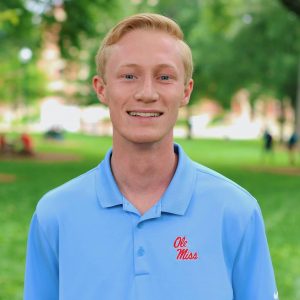 Jacob Ferguson is the winner of the 2018-2019 Franklin Riley prize for best undergraduate paper for his work on “Paternalism and Property Rights in the Slaveholding South: F.A.P. Barnard’s Trial at the University of Mississippi, White Southerners, and Slave Testimonies.” This prize, which was decided by an awards committee consisting of Professors Rebecca Marchiel (chair), Garrett Felber, and Eva Payne, comes with a $250 award.
Jacob Ferguson is the winner of the 2018-2019 Franklin Riley prize for best undergraduate paper for his work on “Paternalism and Property Rights in the Slaveholding South: F.A.P. Barnard’s Trial at the University of Mississippi, White Southerners, and Slave Testimonies.” This prize, which was decided by an awards committee consisting of Professors Rebecca Marchiel (chair), Garrett Felber, and Eva Payne, comes with a $250 award.
Ferguson’s paper, which was completed for Professor Anne Twitty’s HST 498: Slavery and Its Legacies at the University of Mississippi during Fall 2018, asks why and to what extent white southerners and slave owners listened to slave testimonies. His entry point into this examination is the rape of Jane, an enslaved woman claimed by University of Mississippi Chancellor F.A.P. Barnard, who was attacked by a white student in 1859. Though the Board of Trustees found the accused student legally not guilty, Barnard had the student’s guardians withdraw him from the university, which led to questions among university faculty and prominent community members about whether Barnard was sound on the slavery question. Eventually, Barnard’s decision to take the word of a slave over that of a white student led to a second trial to determine where Barnard’s loyalties lay, and Barnard’s eventual resignation. Ferguson then considers a variety of situations in which enslaved people commanded an audience, including moments when masters were expected to listen to and respond to slave complaints. In discussing these circumstances at length, it arrives at a more nuanced understanding of the traditional master-slave relationship and what it meant to be a respected southern slave master.
 Kaimara Herron is the winner of the 2018-2019 Tennin-Alexander Prize for the best non-thesis graduate history paper for her work on “‘In the Hands of Responsible Persons’: Social Services, Memory, and Politics in the Mississippi State Federation of Colored Women’s Clubs, 1904-1942.” This prize, which was decided by an awards committee consisting of Professors Rebecca Marchiel (chair), Garrett Felber, and Eva Payne, comes with a $750 award.
Kaimara Herron is the winner of the 2018-2019 Tennin-Alexander Prize for the best non-thesis graduate history paper for her work on “‘In the Hands of Responsible Persons’: Social Services, Memory, and Politics in the Mississippi State Federation of Colored Women’s Clubs, 1904-1942.” This prize, which was decided by an awards committee consisting of Professors Rebecca Marchiel (chair), Garrett Felber, and Eva Payne, comes with a $750 award.
Herron’s paper, which was completed for Professor Darren Grem’s HST 702: Research – US from Civil War to Present, demonstrates the centrality of Black clubwomen to 19th century postbellum politics. Building upon Elsa Barkley Brown’s insight that Black women’s formal political exclusion did not equal marginalization from informal political influence through collective community politics, Herron argues that these clubwomen’s activism cannot not be reduced to “racial uplift.” By tracing two of the Mississippi State Federation of Colored Women’s Clubs’ projects – the Old Folks Home in Vicksburg, MS and the Margaret Murray Washington Home for Juvenile Delinquents near Clinton, MS – Herron shows how memory work and the politics of space were used in the absence of formal policymaking channels. For example, while white women used social and political capital to reshape the physical landscape of the New South with confederate monuments, school curricula, and venerations of the Lost Cause, the MSFCWC reclaimed and renovated antebellum homes intended for the formerly enslaved to create spaces of care and remembrance. Both the Old Folks Home and the Juvenile Home challenged and recast the Lost Cause narrative through a contested politics of space and memory. Through such projects, Black clubwomen in Mississippi engaged in a nuanced form of political engagement not easily reduced to racial uplift or respectability politics.